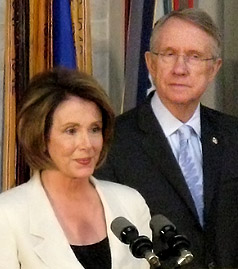With the completion of debate in the Senate and House over the health care reform bill and a move towards reconciling the two pieces of legislation, a Senate Democratic aide confirmed Monday to Truthout that the two chambers plan to forgo a formal conference committee in hopes of getting the final bill passed quickly.
The aide, who requested anonymity due to the sensitivity of the issue, said an informal conference committee hearing will be convened to negotiate the differences between the House and the Senate health care versions of the bill.
The aide added that discussions will be led primarily by Senate Majority Leader Harry Reid (D-Nevada), House Speaker Nancy Pelosi (D-California) and President Obama in conjunction with their House and Senate colleagues.
The web site FireDogLake, which has come out in fierce opposition to the health care bill, “>Senate staffer, speaking anonymously, told Jonathan Cohn, a reporter for the New Republic, regarding the decision to informally debate the bill. “It’s time for a little ping-pong.”
According to Cohn, this will not only expedite the debate, but may also clear the way for a final bill as early as January 2010.
In the textbook trajectory of a bill, the leadership of the Senate and House would appoint a public conference committee comprised of members from both chambers, who would then debate to eventually reach a compromise on the two bills.
The ping-pong process has been used before on TARP legislation, lobbying reform, energy and housing bills and one of the last stimulus bills to speed up decision-making.
“>Conrad told The Wall Street Journal.
Critics of the bill worry about the consequences that the default to the Senate bill may have for the more than 40 million uninsured people in America right now.
“As it stands, the House bill makes health care much more affordable for people than the Senate’s bill. And right now, there is a real possibility that the House will be expected to swallow the Senate’s bill without making these improvements. There are two legislative bodies and both have a say in what reform looks like – “>The Huffington Post, Reid is currently negotiating a “manager’s amendment.” This amendment includes large and small concerns that senators want worked out before voting to end a filibuster, and, in the case of a ping-pong process, effectively makes the manager’s amendment the main place to work out differences.
The amendment would then need to address House concerns sufficiently to bring Speaker Nancy Pelosi on board and win the approval of the House. The heavy Senate input risks alienating the Democratic Party’s progressive base, which prefers the House bill.
